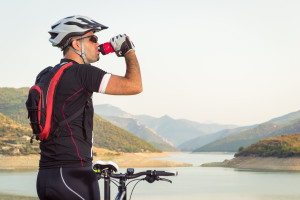 During the summer months, it can be hard to gauge how much fluid we should be taking in throughout our day. There are many different opinions on the matter, from when to drink water, to how much to drink, but it is hard to find a definitive answer. Most health officials agree that it is necessary to replace what you sweat out, but new findings may show that it is possible to actually over-hydrate.
During the summer months, it can be hard to gauge how much fluid we should be taking in throughout our day. There are many different opinions on the matter, from when to drink water, to how much to drink, but it is hard to find a definitive answer. Most health officials agree that it is necessary to replace what you sweat out, but new findings may show that it is possible to actually over-hydrate.
Many athletes hydrate throughout the day before, during, and after their physical activity. A common rule in many locker rooms is to drink before you get thirsty, as many believe that if you wait until you are thirsty, you are already dehydrated. However, an article published in Clinical Journal of Sport Medicine states that hydrating in this manner might actually lead to over-hydration in athletes, also known as “exercise-associated hyponatremia” (EAH). This occurs when an athlete intakes too much water or sports drink to where the body is unable to flush it out, causing the kidneys and cells to swell. To this day, it is estimated that at least 14 athletes have died as a result of this condition.
The study conducted also suggests that it is not only athletes that participate in extreme physical conditioning that experience this condition, but also those with mild exercise habits, such as those involved in yoga or lawn bowls. Symptoms of EAH include dizziness, nausea, and puffiness, but can be as severe as confusion, comas, and even death, as previously mentioned.
Dr. Mitchell H. Rosner, from the Division of Nephrology at University of Virginia Health System, wants people to know of the dangers of inaccurate statements, such as to drink before thirst, can lead to dangerous occurrences. The 2015 EAH Consensus Guidelines suggest that, to avoid the dangers of EAH, the natural stimulations to drink when thirsty should be followed.
Hydration is important, no matter how active you are. Dangers of dehydration and over hydration both can be avoided by simply drinking a glass of water when thirsty and following your body’s natural queues.
